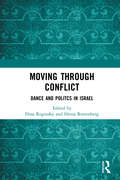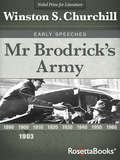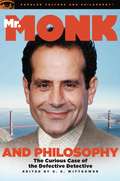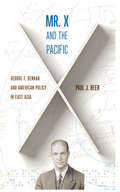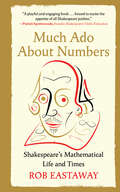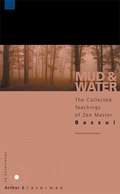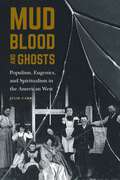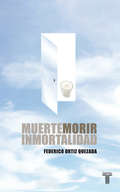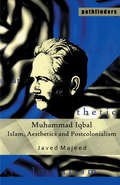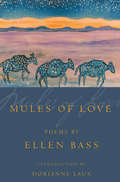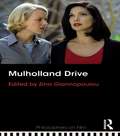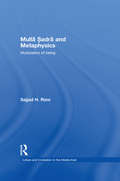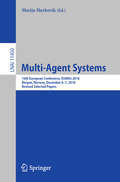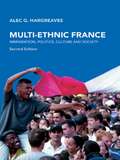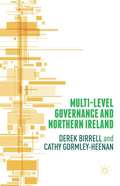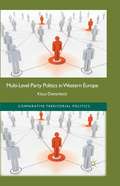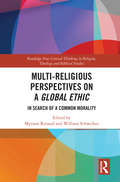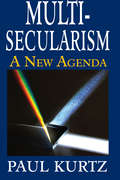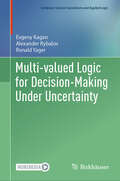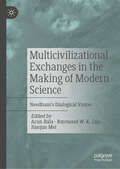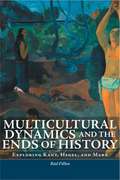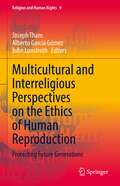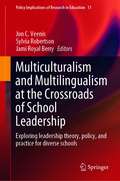- Table View
- List View
Moving through Conflict: Dance and Politcs in Israel
by Dina Roginsky Henia RottenbergMoving through Conflict: Dance and Politics in Israel is a pioneering project in examining the Israeli–Palestinian conflict through dance. It proposes a research framework for study of the social, cultural, aesthetic and political dynamics between Jews and Arabs as reflected in dance from late 19th-century Palestine to present-day Israel. Drawing on multiple disciplines, this book examines a variety of social and theatrical venues (communities, dance groups, evening classes and staged performances), dance genres (folk dancing, social dancing and theatrical dancing) and different cultural identities (Israeli, Palestinian and American). Underlying this work is a fundamental question: can the body and dance operate as nonverbal autonomous agents to mediate change in conflicting settings, transforming the "foreign" into the "familiar"? Or are they bound to their culturally dependent significance – and thus nothing more than additional sites of an embodied politics? This anthology expounds on various studies on dance, historical periods, points of view and points of contact that help promote thinking about this fundamental issue. It will be of great interest to students and scholars of dance studies, sociology, anthropology, art history, education and cultural studies, as well as conflict and resolution studies.
Mozi: A Study and Translation of the Ethical and Political Writings
by John Knoblock Jeffrey RiegelThis volume is a study and translation of thirty-six chapters in the Mozi that are concerned largely with political and ethical philosophy; the remaining seventeen chapters are related to military defense and logic.
Mr Brodrick's Army (Winston S. Churchill Early Speeches)
by Winston S. ChurchillThis eBook reproduces one of Churchill&’s early political pamphlets—a collection of speeches opposing peacetime military expansion in 1903. In 1903, Winston Churchill was a newly elected Member of Parliament, already making a name for himself with his brash yet brilliant oration and passionate political convictions. During this time, John Brodrick, the Secretary of State for War, proposed an expansion of Britain's peacetime military—a plan which Churchill strongly opposed. Churchill attacked Brodrick's plan in six fiery speeches that galvanized the opposition and left Brodrick politically isolated. When it was first printed, Mr. Brodrick's Army made all six speeches available to the public. Now, with fewer than twenty first editions currently in existence, it is the rarest of Churchill's published works. This eBook edition makes this historically significant document available to readers everywhere.
Mr. Monk and Philosophy: The Curious Case of the Defective Detective
by D. E. WittkowerMr. Monk and Philosophy is a carefully and neatly organized collection of eighteen chapters divided into exactly six groups of precisely three chapters each. Drawing on a wide range of philosophers-from Aristotle and Diogenes, to Siddhartha Gautama and St. Thomas Aquinas, to David Hume and Karl Popper-the authors ask how Adrian Monk solves his cases, why he is the way he is, how he thinks, and what we can learn from him. Some of the authors suggest Monk is a kind of tragic hero, whose flaws help us live out and expunge the fear and anxiety we all experience; that he is more than just his personality or memories, but something more individual and indefinable; and that his most distinctive traits are not the traits that make him a detective, but those that make him a friend. His most notable trait is the dedication he shows to his late wife, Trudy.Other authors explore how Monk encounters the world, arguing that his genius comes not from logic or reasoning, but from his ability to see his surroundings in a pre-conceptualized way; that there isn't as much distance between his rational beliefs about crimes and evidence and his irrational phobic beliefs as there might seem; and that his phobias have themselves made him approach himself and the world as something to be overcome.Just how does Mr. Monk come to his conclusions? Does he use inductive, deductive, or abductive reasoning? Is he dependent on a false notion of the law of noncontradiction? Is it possible that his reasoning might have more to do with constructing harmonious stories than it does with evidence, causes, or insights?Some contributors ponder Monk's name and what it means given his views on religion. Some authors argue that Mr. Monk's approach to the world is fundamentally similar to that of medieval monastic orders; that his rituals and deductive 'dancing' show how he exhibits a kind of shamanism; and that he acts in accordance with the Bodhisattva ideal, bringing others to enlightenment through circumstances and by accident, even though he has no such intention or goal.In one chapter, the author asks how the character Monk is related to other similar characters, arguing that Monk and House are closely related characters, each based on the conflict between reason and emotion which exemplifies the motif of the "troubled genius;" that Monk and House both pursue ethical practices and goals even as they fail at the everyday face-to-face ethics of normal social interactions; and that great detectives all, through their flaws, help us to understand and forgive ourselves for our flaws.And finally, there are several chapters in which the authors consider Monk from the psychologist's perspective, discussing how Monk's relationship with Trudy, while having unhealthy codependent elements, demonstrates some important aspects of successful romantic partnerships; how laughter plays a difficult role in mental illness, and the difficult position that the show and therapists are placed in when having to treat seriously disorders that are both tragic and comic; and how, from a psychoanalytic perspective, Monk's inability to mourn shows us why we both reject and are drawn towards death.In the words of author D. E. Wittkower, "In order to be sure that the reader is able to enjoy the book, every chapter will have an even number of words. You'll thank me later."
Mr. X and the Pacific: George F. Kennan and American Policy in East Asia
by Paul J. HeerGeorge F. Kennan is well known for articulating the strategic concept of containment, which would be the centerpiece of what became the Truman Doctrine. During his influential Cold War career he was the preeminent American expert on the Soviet Union. In Mr. X and the Pacific, Paul J. Heer explores Kennan’s equally important impact on East Asia.Heer chronicles and assesses Kennan’s work in affecting U.S. policy toward East Asia. By tracing the origins, development, and bearing of Kennan’s strategic perspective on the Far East during and after his time as director of the State Department’s Policy Planning Staff from 1947 to 1950, Heer shows how Kennan moved from being an ardent and hawkish Cold Warrior to, by the 1960s, a prominent critic of American participation in the Vietnam War.Mr. X and the Pacific provides close examinations of Kennan’s engagement with China (both the People’s Republic and Taiwan), Japan, Korea, and Vietnam. Country-by-country analysis paired with considerations of the ebb and flow of Kennan’s global strategic thinking result in a significant extension of our estimation of Kennan’s influence and a deepening of our understanding of this key figure in the early years of the Cold War. In Mr. X and the Pacific Heer offers readers a new view of Kennan, revealing his importance and the totality of his role in East Asia policy, his struggle with American foreign policy in the region, and the ways in which Kennan’s legacy still has implications for how the United States approaches the region in the twenty-first century.
Much Ado About Numbers: Shakespeare's Mathematical Life and Times
by Rob EastawayOpen a new portal into Shakespeare’s words—and his Renaissance life—with math and numbers as your key. Shakespeare’s era was abuzz with mathematical progress, from the new concept of “zero” to Galileo’s redraft of the heavens. Now, Rob Eastaway uncovers the many surprising ways math shaped Shakespeare’s plays—and his world—touring astronomy, code-breaking, color theory, navigation, music, sports, and more. How reliable was a pocket sundial? Was math illusionist John Dee the real-life Prospero? How long was a Scottish mile, and what could you buy for a groat? Do Jupiter’s moons have a cameo in Cymbeline? How did ordinary people use numbers day to day? And might Shakespeare have tried that game-changing invention—the pencil? Full of delights for devotees of both Tudor history and the Bard, Much Ado About Numbers is proof that the arts and sciences have always danced together.
Mud and Water
by Bassui Tokusho Arthur BravermanThe fourteenth-century Zen master Bassui was recognized as one of the most important Zen teachers of his time. Accessible and eloquent, these teachings cut to the heart of the great matter of Zen, pointing directly to the importance of seeing our own original nature and recognizing it as Buddhahood itself. Bassui is taking familiar concepts in Buddhism and recasting them in an essential Zen light. Though he lived centuries ago in a culture vastly different from our own, Zen Master Bassui speaks with a voice that spans time and space to address our own modern challenges - in our lives and spiritual practice. Like the revered Master Dogen several generations before him, Bassui was dissatisfied with what passed for Zen training, and taught a radically reenergized form of Zen, emphasizing deep and direct penetration into one's own true nature. And also like Dogen, Bassui uses powerful and often poetic language to take familiar Buddhist concepts recast them in a radically non-dual Zen light, making ancient doctrines vividly relevant. This edition of Mud and Water contains several teachings never before translated.
Mud, Blood, and Ghosts: Populism, Eugenics, and Spiritualism in the American West
by Julie CarrPopulism has become a global movement associated with nationalism and strong-man politicians, but its root causes remain elusive. Mud, Blood, and Ghosts exposes one deep root in the soil of the American Great Plains. Julie Carr traces her own family&’s history through archival documents to draw connections between U.S. agrarian populism, spiritualism, and eugenics, helping readers to understand populism&’s tendency toward racism and exclusion. Carr follows the story of her great-grandfather Omer Madison Kem, three-term Populist representative from Nebraska, avid spiritualist, and committed eugenicist, to explore persistent themes in U.S. history: property, personhood, exclusion, and belonging. While recent books have taken seriously the experiences of poor whites in rural America, they haven&’t traced the story to its origins. Carr connects Kem&’s journey with that of America&’s white establishment and its fury of nativism in the 1920s. Presenting crucial narratives of Indigenous resistance, interracial alliance and betrayal, radical feminism, lifelong hauntings, land policy, debt, shame, grief, and avarice from the Gilded Age through the Progressive Era, Carr asks whether we can embrace the Populists&’ profound hopes for a just economy while rejecting the barriers they set up around who was considered fully human, fully worthy of this dreamed society.
Muerte, morir, inmortalidad
by Federico Ortiz QuezadaEste libro tiene la intención de ordenar algunas ideas respecto de la muerte y el acto de morir. Nacer y morir son las dos constantes de toda vida. Vivimos inmersos en ellas y, aun cuando vivir ofrece la certeza de la muerte, evitamos reflexionar en torno a este tema y lo dejamos en manos de la religión.Sin embargo, tenemos muchas preguntas que nos inquietan: ¿cómo debe tratarse al moribundo?, ¿qué le acontece al ser humano cuando muere?, ¿existe la inmortalidad humana?Escrito por un especialista en las ideas respecto a la muerte, este libro ofrece, desde una perspectiva científica, una respuesta a las interrogantes que a diario nos hacemos. Analiza las ideas religiosas y filosóficas vigentes respecto a la muerte, describe lo que la medicina hace para paliar el dolor del moribundo y del duelo familiar y reflexiona en torno a la inmortalidad humana.
Muhammad Iqbal: Islam, Aesthetics and Postcolonialism (Pathfinders Ser.)
by Javed MajeedBringing together Islamic studies, a postcolonial literary perspective, and a focus on the interaction between aesthetics and politics, this book analyses Iqbal’s Islamism through his poetry. It argues that his notion of an Islamist selfhood was expressed in his verse through the interplay between poetic tradition and creative innovation. It also considers how Iqbal expressed an Islamist geopolitical imagination in his work, and examines his exploration of the relationship between the modern West and a reconstructed Islam. For the first time, Iqbal’s personal letters have been drawn upon to provide an insight into his inner conflicts as articulated in his poetry. Concentrating on the complexity of his work in its own right, the book eschews the standard appropriation of Iqbal into any one political agenda — be it Indian nationalism, Muslim separatism or Iranian Islamic republicanism. With its analytical and in-depth reading of Iqbal’s verse and prose, this book opens a fresh perspective on Islam and postcolonialism. It will be a fascinating study for general readers and readers with interests in the intellectual and political history of modern South Asia, colonialism and postcolonialism, Islamic studies, and modern South Asian literature (especially Urdu and Persian poetry).
Mules of Love
by Ellen BassBalancing heart-intelligent intimacy and surprising humor, the poems in Ellen Bass's Mules of Love illuminate the essential dynamics of our lives: family, community, sexual love, joy, loss, religion and death. The poems also explore the darker aspects of humanity--personal, cultural, historical and environmental violence--all of which are handled with compassion and grace. Bass's poetic gift is her ability to commiserate with others afflicted by similar hungers and grief. Her poem "Insomnia" concludes: "may something/ comfort you--a mockingbird, a breeze, rain/ on the roof, Chopin's Nocturnes, the thought/ of your child's birth, a kiss,/ or even me--in my chilly kitchen/ with my coat on--thinking of you."Marketing Plans: * National advertising * National media campaign * Advance reader copies * Course adoption mailingAuthor Tour: * Berkeley * Boston * Minneapolis * San Francisco * Santa CruzEllen Bass is co-author (with Laura Davis) of the best-selling The Courage to Heal: A Guide for Women Survivors of Child Sexual Abuse (HarperCollins 1988, 1994), which has sold more than one million copies and has been translated into nine languages. She has also published several volumes of poetry, and her poems have appeared in hundreds of journals and anthologies, including The Atlantic Monthly, Ms., Double Take, and Field. In 1980, Ms. Bass was awarded the Elliston Book Award for Poetry from the University of Cincinnati. Last year, she won Nimrod/Hardman's Pablo Neruda Prize for Poetry, judged by Thomas Lux. She was nominated for a 2001 Pushcart Prize. She lives in Santa Cruz, where she has taught creative writing for 25 years. She has also taught writing workshops at many conferences nationally and in Mallorca, Spain.
Mules of Love (American Poets Continuum)
by Ellen BassBalancing heart-intelligent intimacy and surprising humor, the poems in Ellen Bass’s Mules of Love illuminate the essential dynamics of our lives: family, community, sexual love, joy, loss, religion and death. The poems also explore the darker aspects of humanity—personal, cultural, historical and environmental violence—all of which are handled with compassion and grace. Bass’s poetic gift is her ability to commiserate with others afflicted by similar hungers and grief. Her poem "Insomnia" concludes: "may something/ comfort you—a mockingbird, a breeze, rain/ on the roof, Chopin’s Nocturnes, the thought/ of your child’s birth, a kiss,/ or even me—in my chilly kitchen/ with my coat on—thinking of you."Marketing Plans: • National advertising • National media campaign • Advance reader copies • Course adoption mailingAuthor Tour: • Berkeley • Boston • Minneapolis • San Francisco • Santa CruzEllen Bass is co-author (with Laura Davis) of the best-selling The Courage to Heal: A Guide for Women Survivors of Child Sexual Abuse (HarperCollins 1988, 1994), which has sold more than one million copies and has been translated into nine languages. She has also published several volumes of poetry, and her poems have appeared in hundreds of journals and anthologies, including The Atlantic Monthly, Ms., Double Take, and Field. In 1980, Ms. Bass was awarded the Elliston Book Award for Poetry from the University of Cincinnati. Last year, she won Nimrod/Hardman’s Pablo Neruda Prize for Poetry, judged by Thomas Lux. She was nominated for a 2001 Pushcart Prize. She lives in Santa Cruz, where she has taught creative writing for 25 years. She has also taught writing workshops at many conferences nationally and in Mallorca, Spain.
Mulholland Drive: Mulholland Drive (Philosophers on Film)
by Zina GiannopoulouBeloved by film and art aficionados and fans of neo-noir cinema, Mulholland Drive is one of the most important and enigmatic films of recent years. It occupies a central and controversial position in the work of its director, David Lynch, who won the best director award at the 2001 Cannes Film Festival for the movie. Mulholland Drive in the Routledge Philosophers on Film series is the first full philosophical appraisal of Lynch's film. Beginning with an introduction by the editor, the volume explores the following topics: the identity of the self and its persistence through time the central, dual roles played by fantasy and reality throughout the film whether Mulholland Drive is best understood epistemologically via reason and language, or whether, as Lynch himself argues, by one's 'inner feelings' and emotions parallels between Mulholland Drive and Kafka's The Castle, both of which pit their protagonists at the mercy of unseen forces Mulholland Drive and romanticism. Additional key themes are also discussed, such as the interpenetration of ethics, classical tragedy, and the contrasting philosophical arguments of Plato and Nietzsche on tragic drama. These themes make Mulholland Drive essential and engaging reading for students of philosophy, especially aesthetics and ethics, as well as film studies.
Mulla Sadra and Metaphysics: Modulation of Being (Culture and Civilization in the Middle East)
by Sajjad H. RizviMulla Sadra is one of the most important Islamic philosophers after Avicenna. In this exploration of his philosophy, Sajjad H. Rizvi examines the central doctrine of the modulation of being, and contextualises his work within the intellectual history of philosophical traditions in the Islamic East. Reading and critiquing the works of Mulla Sadra from an analytical perspective, this book pays particular attention to his text the Asfar, a work which, due to its complexity, is often overlooked. Looking at the concept of philosophy as a way of life and a therapeutic practice, this book explores the paradigm of the modulation of being in the philosophical method and metaphysics of Mulla Sadra and considers its different manifestations. Rizvi relates his philosophy to larger trends and provides a review of the field, charting and critiquing the discussion on the topic to date and exploring recent thought in this direction, to show how Sadrian thought was addressed well into the 19th and 20th centuries. This major contribution to the study of Mulla Sadra and the intellectual life of the Safavid period fills an important gap in the field of Sadra studies and Islamic philosophy, and is indispensable to students of philosophy, religion and Islamic studies, and Islamic philosophy in particular.
Multi-Agent Systems: 16th European Conference, EUMAS 2018, Bergen, Norway, December 6–7, 2018, Revised Selected Papers (Lecture Notes in Computer Science #11450)
by Marija SlavkovikThis book constitutes the revised post-conference proceedings of the 16th European Conference on Multi-Agent Systems, EUMAS 2018, held at Bergen, Norway, in December 2018.The 18 full papers presented in this volume were carefully reviewed and selected from a total of 34 submissions. The papers report on both early and mature research and cover a wide range of topics in the field of multi-agent systems.
Multi-Ethnic France: Immigration, Politics, Culture and Society
by Alec G. HargreavesThis second edition of Multi-Ethnic France spans politics and economics, social structures and cultural practices and has been updated to cover events which have occurred on the national and international stage since the first edition was published. These include: recent developments in the Banlieues, including the riots of 2005 the growing visibility of sub-Saharan Africans in France's evolving ethnic mix the reverberations in France of international developments such as 9/11, the second Intifada and the Iraq Wars the renewed controversy over the wearing of the Islamic headscarf the development of anti-discrimination policy and the debate over 'positive discrimination'. Immigration is one of the most significant and persistent issues in contemporary France. It has become central to political debate with the rise, on one side, of Jean-Marie Le Pen's extreme right-wing party and, on the other, of Islamist terrorism. In Multi-Ethnic France, Alec G. Hargreaves unmasks the prejudices and misconceptions faced by minorities of Muslim heritage and lays bare the social and political neglect behind the riots of 2005. This second edition is fully updated, and includes a glossary and chronology, as well as a revised bibliography.
Multi-Level Governance and Northern Ireland
by Derek Birrell Cathy Gormley-HeenanThis book examines the governance arrangements in Northern Ireland through a multi-level lens, particularly in the period since the new institutions established through the 1998 Agreement became more firmly embedded.
Multi-Level Party Politics in Western Europe
by Klaus DetterbeckMulti-Level Party Politics in Western Europe is a study of territorial dynamics within party systems and party organizations in Western European multi-layered systems. It argues that processes of state restructuring and party crisis have forced parties to adapt their competitive strategies and internal structures. With the logic of territorial party competition becoming more complex, parties in Europe have developed quite different responses to deal with the challenges of multi-level politics. This book challenges the 'national bias' of party research which has traditionally focused on the statewide level by assuming broadly uniform patterns. Speaking to students of party politics and territorial studies, it contributes to a new territorial approach which acknowledges the importance of multi-layered institutional framing for party politics. Its also includes a thorough comparative analysis of vertical linkages and sub-state autonomy in Austrian, Belgian, British, German and Spanish parties.
Multi-Religious Perspectives on a Global Ethic: In Search of a Common Morality (Routledge New Critical Thinking in Religion, Theology and Biblical Studies)
by William Schweiker Myriam RenaudRatified by the Parliament of the World’s Religions in 1993 and expanded in 2018, "Towards a Global Ethic (An Initial Declaration)," or the Global Ethic, expresses the minimal set of principles shared by people—religious or not. Though it is a secular document, the Global Ethic emerged after months of collaborative, interreligious dialogue dedicated to identifying a common ethical framework. This volume tests and contests the claim that the Global Ethic’s ethical directives can be found in the world’s religious, spiritual, and cultural traditions. The book features essays by scholars of religion who grapple with the practical implications of the Global Ethic’s directives when applied to issues like women’s rights, displaced peoples, income and wealth inequality, India’s caste system, and more. The scholars explore their respective religious traditions’ ethical response to one or more of these issues and compares them to the ethical response elaborated by the Global Ethic. The traditions included are Hinduism, Engaged Buddhism, Shi‘i Islam, Sunni Islam, Confucianism, Protestantism, Catholicism, Judaism, Indigenous African Religions, and Human Rights. To highlight the complexities within traditions, most essays are followed by a brief response by an expert in the same tradition. Multi-Religious Perspectives on a Global Ethic is of special interest to advanced students and scholars whose work focuses on the religious traditions listed above, on comparative religion, religious ethics, comparative ethics, and common morality.
Multi-Secularism: A New Agenda
by Paul KurtzThe contemporary world is witness to an intense controversy about secularism. This controversy has intensified due to the presence of fundamentalism, which challenges secular society and the secularization of philosophical ideas and ethical values.Secularists maintain that the state should not impose a religious creed upon citizens and should respect freedom of conscience, the right to believe or disbelieve in the prevailing orthodoxy. This right is guaranteed by the First Amendment to the US Constitution and the Rights of Man enunciated in the French Revolution. Yet many powerful religious institutions do not accept this principle.Paul Kurtz argues that secularism needs to be allied to the emergence of democratic institutions that respect individual freedom and the pluralistic society. He argues that a defense of secularism entails a defense of the civic virtues of democracy, which include the toleration of dissent and alternative lifestyles and the willingness to negotiate differences. Consequently, secularism will take different forms in different societies; the term multi-secularism best describes that. Many people believe that it is impossible to maintain a moral order without the support of religion. Kurtz vigorously denies that, and this volume attempts to explicate the values and principles of secular morality, which he sees as the cornerstone of the open democratic society.Kurtz was involved in the campaign for secularism throughout his career as a philosopher. This book reflects his participation in this battle and extends his thinking to new areas.
Multi-valued Logic for Decision-Making Under Uncertainty (Computer Science Foundations and Applied Logic)
by Ronald Yager Evgeny Kagan Alexander RybalovMulti-valued and fuzzy logics provide mathematical and computational tools for handling imperfect information and decision-making with rational collective reasoning and irrational individual judgements. The suggested implementation of multi-valued logics is based on the uninorm and absorbing norm with generating functions defined by probability distributions. Natural extensions of these logics result in non-commutative and non-distributive logics. In addition to Boolean truth values, these logics handle subjective truth and false values and model irrational decisions. Dynamics of decision-making are specified by the subjective Markov process and learning – by neural network with extended Tsetlin neurons. Application of the suggested methods is illustrated by modelling of irrational economic decisions and biased reasoning in the wisdom-of-the-crowd method, and by control of mobile robots and navigation of their groups. Topics and features: Bridges the gap between fuzzy and probability methods Includes examples in the field of machine-learning and robots’ control Defines formal models of subjective judgements and decision-making Presents practical techniques for solving non-probabilistic decision-making problems Initiates further research in non-commutative and non-distributive logics The book forms a basis for theoretical studies and practice of decision-making under uncertainty and will be useful for computer scientists and mathematicians interested in multi-valued and fuzzy logic, as well as for engineers working in the field of data mining and data analysis.
Multicivilizational Exchanges in the Making of Modern Science: Needham’s Dialogical Vision
by Arun Bala Raymond W. K. Lau Jianjun MeiThis book explores how and why exchanges across civilizations have come to enrich science today. The dialogical dimension of the history of science has long been marginalized by an excessive concern on why modern science emerged in Europe, but not in any of the advanced civilizations of the East. This focus upon what has been called Joseph Needham's "Grand Comparative Question" ignores his other project, focused on showing how dialogues between civilizations have nurtured science. Needham's "Grand Dialogical Question" – if we may call it that by parity – has directly or indirectly inspired a vast body of literature showing how interconnections of civilizations over the last three thousand years, and exchanges of cosmological, mathematical, geographical, physical, biological and medical technologies, techniques, practices and knowledge, have been woven together to produce current science. Bringing together scholars whose research range across multiple civilizations and disciplines, this book investigates the scope and limits of Needham's dialogical vision for science.
Multicultural Dynamics and the Ends of History: Exploring Kant, Hegel, and Marx (Philosophica)
by Real FillionMulticultural Dynamics and the Ends of History provides a strikingly original reading of key texts in the philosophy of history by Kant, Hegel, and Marx, as well as strong arguments for why these texts are still relevant to understanding history today. Réal Fillion offers a critical exposition of the theses of these three authors on the dynamics and the ends of history, in order to provide an answer to the question: "Where are we headed?" Grounding his answer in the twin observations that the world is becoming increasingly multicultural and increasingly unified, Fillion reasserts the task of the speculative philosophy of history as it had been understood by German philosophy: the articulation and understanding the historical process as a developmental whole. Fillion's interpretation engages many recent strands of social and political thought in order to provide a new understanding of current events, and possible futures, grounded in the understanding of the dynamics of the past and the present provided by Kant, Hegel, and Marx. The result is a rich and timely answer to the question of where our world is headed today.
Multicultural and Interreligious Perspectives on the Ethics of Human Reproduction: Protecting Future Generations (Religion and Human Rights #9)
by Joseph Tham Alberto Garcia Gómez John LunstrothThis book includes a number of distinct religious and secular views on the anthropological, ethical and social challenges of reproductive technologies in the light of human rights and in the context of global bioethics. It includes contributions of bioethics experts from six major religions—Buddhism, Confucianism, Christianity, Islam, Hinduism and Judaism—as well as secular authors. The chapters include commentaries discussing the content cross-religious/secular tradition to give a comparative perspective. Not only the volume editors but also the contributing authors took part in reviewing each others’ chapter making this a unique collected volume, not common in interreligious dialogue today. This text appeals to researchers and students working in the fields of bioethics and religious/secular studies.
Multiculturalism and Multilingualism at the Crossroads of School Leadership: Exploring leadership theory, policy, and practice for diverse schools (Policy Implications of Research in Education #11)
by Jon C. Veenis Sylvia Robertson Jami Royal BerryThis volume builds upon emergent understandings about educational leadership and policy in hopes of continuing to refine our understanding of what effective leadership means in linguistically and culturally diverse school contexts. The volume seeks to entrench a deeper understanding of the broader leadership policies and practices that promote the success of linguistically and culturally diverse students, while also recognizing that effective leadership can be highly dependent on context. It offers original empirical research that enhances an understanding of the interdependencies between leadership, culture, language, and policy (i.e., the mechanisms that engender or hinder successful stewardship of linguistic and cultural plurality). The confluence of school leadership, linguistic diversity, and multiculturalism makes this volume unique, especially considering the pace at which global migration continues to accelerate, coupled with the need to accommodate an array of diverse learning needs in today’s schools.
